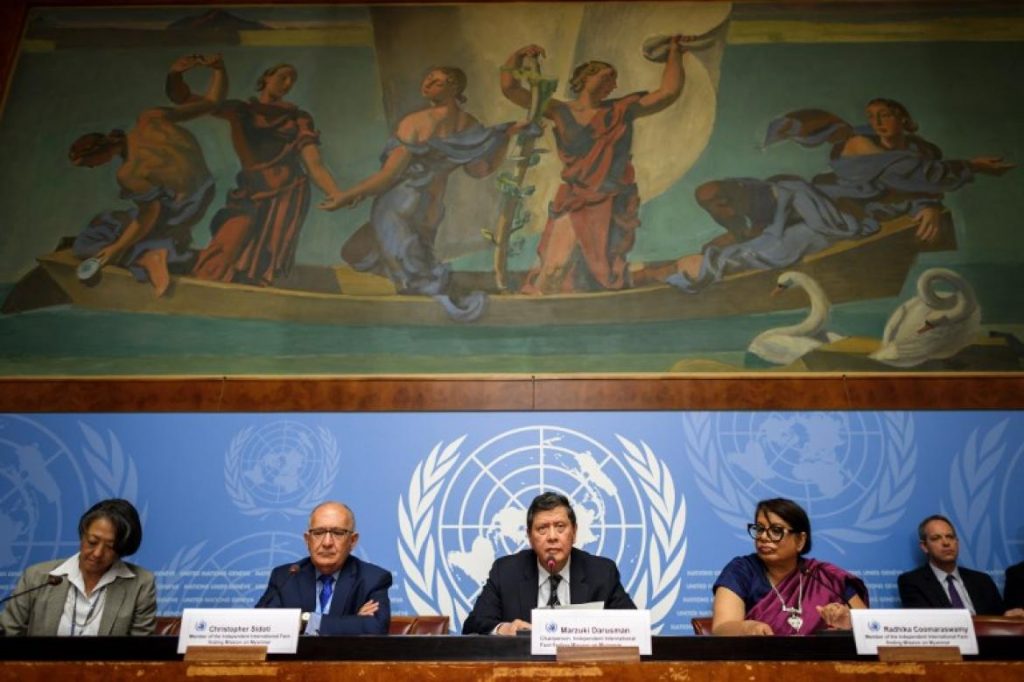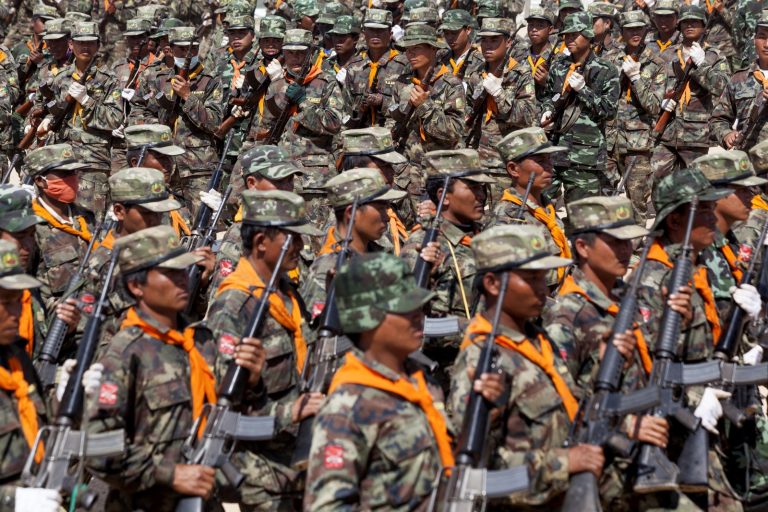By OLIVER SLOW | DOH ATHAN
YANGON — On August 27, the United Nations Fact-Finding Mission on Myanmar announced their initial findings. The commission was tasked with investigating alleged human rights abuses in Myanmar, with a focus on Rakhine.
They said that senior members of the military, including commander-in-chief Senior General Min Aung Hlaing, should be investigated for genocide following last year’s military crackdown in Rakhine State, which saw an estimated 700,000 people, mainly Rohingya, flee over the border into Bangladesh.
The mission also said that crimes against humanity and war crimes were committed by the Tatmadaw in Rakhine State, as well as in Kachin and Shan states. Fact-finding mission chairman Marzuki Darusman spoke to Doh Athan about the mission’s findings, ahead of the submission of its final report, which will take place on September 18.
What were some of the most important findings from your mission report?
Simply put, the three gravest crimes in international law. This relates to genocide, crimes against humanity and war crimes. Genocide is specifically applicable to Rakhine State, and crimes against humanity to all these three states [Rakhine, Kachin and Shan], including war crimes.
Genocide is quite a serious accusation. Can you explain how you came to that conclusion?
Support more independent journalism like this. Sign up to be a Frontier member.
It was a very meticulous fact finding exercise. Our principle was to be led by the facts until we came to a considered conclusion, and then based on the UN principle of reasonable grounds, to conclude that these three grave crimes took place.
Having said that, this is clearly a matter to be undertaken by a judiciary mechanism; we are not a judiciary mechanism, we are a fact-finding entity, but we were tasked and mandated by the UN Human Rights Council to lay down the path towards an eventual accountability process, and that is exactly what we were able to do.
These findings have been corroborated again and again, against other facts, and we feel completely justified in recommending that a number of alleged perpetrators warrant being investigated and eventually prosecuted by a court of law to determine their guilt or innocence.
The facts have been overwhelming, in that all elements of genocide have been met, except on the point of displacement of children into other families, which is explicitly laid out in the Geneva Convention on Genocide. We have destruction of the group, partially or wholly, and we have elements of intent.
The elements of intent is based on the definition within the convention, but also on an understanding of genocide, which rests on the precedent of previous tribunals, primarily the Yugoslav and Rwanda tribunals, and which allows that intent can be inferred from actions on the ground.
All these elements are there, and therefore on the basis of the findings we are now recommending that six names be identified as those most responsible for the actions which took place in August 2017.
The fact-finding mission was denied access to Myanmar by the government. How did this impact your work, and are you confident you have collected all of the necessary information?
The mission was denied access to the country, and therefore we had to work around the country, within so-called impacted countries, in this case Thailand, Malaysia, Indonesia and Bangladesh, primarily.
The United Nations has been doing fact-finding commissions of enquiry for 30 to 40 years. The process norms have been distilled from experience, and it’s not exceptional for a mission to be denied access to a country. In the case of the mission being denied [access], there are certain norms and operational techniques that will be followed, to allow the report to be produced on the basis of a credible process of fact-finding.
What we did was meet and interview a number of witnesses and collect testimonies, amounting to 875 testimonies and interviews.
In Cox’s Bazar, we met the very people that have been pushed out, and therefore we were ironically given direct access to the primary sources. These are the victims that have been driven out of the country, and the same people that we would have been interviewing had we been given access to the country.
There’s no question at all around the credibility of the report. The Myanmar government’s skepticism about its credibility, on the basis that we were denied access, is not an argument against the report. In fact, it is a disingenuous argument. They denied us access, and now they’re telling us that the report is not credible.
What do you make of the government’s comments rejecting the report? Is that a concern?
No. We are getting a continuing stream of statements from various governments supporting the findings of the fact-finding mission. The support that has been given to the report speaks for itself, and that the overwhelming number of countries and governments put great credence on the credibility of the report. In that sense, the government of Myanmar may be an outlier in this matter.
But this is an initial report; the full report of around 400 pages will be submitted on September 18 at the UN Human Rights Council.
In your report, you said that the ARSA attacks were “foreseeable and planned”, could you elaborate on how you came to that conclusion?
We acknowledge in the report that ARSA were complicit in war crimes.
Specifically what happened in August 2017 was that an assault by a handful of members of the Rohingya community was made on a number of police posts.
What happened subsequently was a massive retaliatory action on the part of the Myanmar government, which totally supersedes the boundary of proportionality in responding to such an action.
The fact that the [military] were able to mount such a massive attack on the community after a short period indicated that this action was anticipated, and therefore there were preparations, long preparations in getting the forces on the ground to ward the community towards the Bangladesh border, and to finally push them out of Myanmar.
The speed and scale of retaliatory actions were disproportionate to the actions of ARSA, which indicates that there was meticulous preparation and readiness of the Tatmadaw armed forces in anticipating that this would take place in August 2017.
The report also said that Myanmar failing to act on this issue could “destroy the democratic reform process”. What did you mean by that?
We are undertaking this fact-finding mission with the best of intentions and with the view that a solution needs to be found to rectify and to correct this situation.
Therefore we do recognise that a democratisation process has been underway since 2015 when the National League for Democracy won the elections overwhelmingly, but the August 2017 events have completely set back this democratisation process.
We’ve painted a very dismal picture, but at the same time we see that there is still hope for a resolution to address the situation. It’s a balanced approach which takes into account the shortcomings of the democratisation process, and at the same time recognises the start of a process of change within the country, and that is welcome.
But we make it very clear, and we are at pains to point out, that the Tatmadaw … are the most responsible for what took place.







